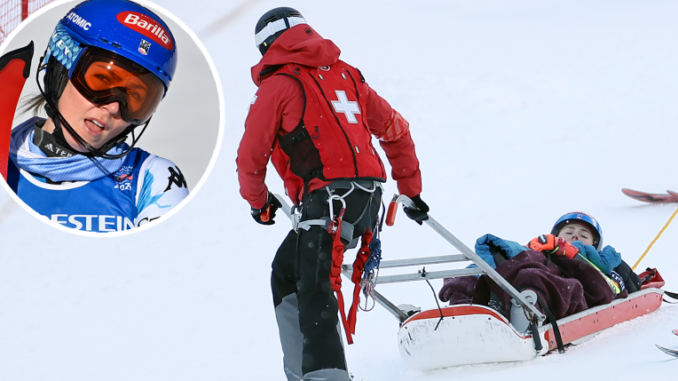
Bad news: Shiffrin Faces Uncertainty After Experiencing ‘Visions of Crashing’ on the Slopes; Skiing Comeback Delayed Until 2029.
In a turn of events that has shocked both the skiing world and her legions of fans, American skiing sensation Mikaela Shiffrin has announced that she will not be able to return to competitive skiing until 2029 after experiencing alarming “visions of crashing” during a recent training session. This revelation comes as a huge blow to the 28-year-old, who has dominated the slopes in recent years with an unmatched winning record in Alpine skiing.
Shiffrin, who had been gearing up for a potential comeback following a minor injury setback in 2024, opened up to the press about the mental and physical challenges she has been grappling with. In a candid interview, she revealed that during one of her practice runs, she began experiencing vivid and unsettling “visions” of herself crashing—an intense mental experience that disrupted her focus and left her shaken.
These visions, which she described as feeling almost like a premonition or haunting recollection, began to affect her performance and mental state. Shiffrin explained that while she had faced physical challenges throughout her career, this was the first time she had encountered such a strong psychological block that kept her from feeling confident on the slopes.
“I’ve always been someone who trusts my instincts and my body when I’m racing,” Shiffrin said. “But these visions were different. It wasn’t just a fear or doubt; it was a feeling like I was seeing the crash happening before it even occurred. It’s like my body knew what was coming, but my mind couldn’t handle the pressure.”
She further elaborated that these episodes left her exhausted mentally and physically, to the point where she had to step away from the sport she had so passionately pursued. Despite her many triumphs on the World Cup circuit, winning over 80 World Cup races and dominating events like the World Championships and Winter Olympics, Shiffrin revealed that the psychological toll of these “visions” has been significant. In an emotional moment, she acknowledged that the mental aspect of skiing might now be more challenging than the physical demands of the sport.
The mental strain on Shiffrin is particularly unexpected given her past resilience. Over the years, she’s faced injuries, tragedies, and intense pressure, yet has always managed to bounce back stronger. The mental aspect of ski racing is something many athletes struggle with, but Shiffrin’s openness about her experience highlights a lesser-discussed issue in elite sports: the mental battle behind the scenes.
However, despite this unexpected mental barrier, Shiffrin is resolute in her decision to take time off from the sport and prioritize her well-being. With no specific date for her return, Shiffrin revealed that she will not be competing again until 2029, focusing instead on mental health and regaining her passion for skiing in a way that feels fulfilling and not forced.
“I want to make sure that when I come back, I’m 100% physically and mentally. Skiing is something I love, but it’s not worth risking my safety or mental health. I want to ski when I can truly enjoy the experience and not feel like I’m constantly battling fear,” she explained.
Her decision to step away from the sport for such an extended period is unprecedented in the career of someone at the peak of their performance. Most athletes at Shiffrin’s level would not even consider taking such a long break, fearing they would fall out of the competitive loop or lose their form. Yet, for Shiffrin, this break is necessary to ensure that she can return to the sport as a healthier and happier version of herself.
In response to Shiffrin’s announcement, fans, fellow athletes, and sports professionals have expressed support for the skier’s decision. U.S. Ski Team Director, John D. Reddick, called Shiffrin’s commitment to mental health “admirable.” “We’ve always known Mikaela to be a fierce competitor, but her ability to make tough decisions when it comes to her health shows maturity and courage,” he said.
Psychologists and sports experts have echoed similar sentiments, acknowledging that mental health struggles can be just as, if not more, debilitating than physical injuries. In competitive sports, athletes often feel pressure to push through psychological struggles, but it can lead to burnout, performance decline, or even long-term damage.
“Elite athletes, especially those as skilled as Mikaela, are not immune to mental health challenges,” noted Dr. Sarah Davidson, a sports psychologist. “When you’ve spent so many years in the public eye, always striving for perfection, it can be difficult to recognize when you need to take a step back. Mikaela’s decision to prioritize her mental well-being is a powerful reminder that success doesn’t just come from pushing through adversity—it’s also about knowing when to pause, heal, and reset.”
Shiffrin’s decision to delay her return to the slopes until 2029 also raises important questions about the future of her career and what her legacy will look like. Many fans have feared that her absence from competitive racing could mean the end of her illustrious career. But Shiffrin’s track record of success means that she still holds an extraordinary legacy in Alpine skiing, regardless of what the future holds. Her commitment to overcoming adversity and her ability to speak openly about mental health will undoubtedly inspire future generations of athletes.
In the meantime, Shiffrin will focus on other aspects of her life, including her personal relationships, charity work, and possibly even mentoring young athletes. Although her immediate future in skiing remains uncertain, one thing is clear: Mikaela Shiffrin’s journey is far from over.
For now, her fans can only hope that the champion will find the time she needs to heal, both physically and mentally, before embarking on what would undoubtedly be an incredible return to the sport that has defined her life.



Be the first to comment